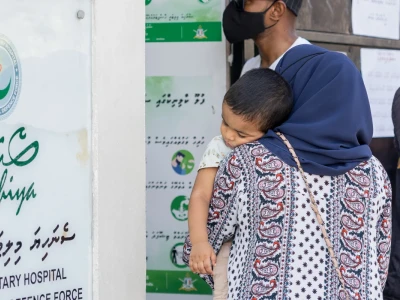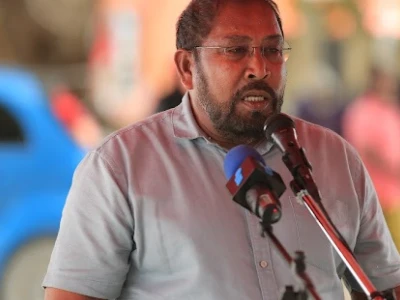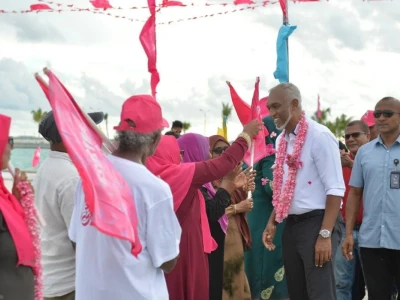
Faris releases manifesto with promise to cut GST to 3%
The manifesto includes proposals for a long-term national development plan, with educational and reform changes.
Faris Maumoon, independent presidential candidate, released his manifesto on Sunday, promising to reduce the general Goods and Services Tax (GST) to 3% and reform the self-determination of MPs’ salaries.
The manifesto was launched at a rally in Sultan Park on Sunday by Faris and his running mate Dr Abdul Sattar Yusuf.
The manifesto includes proposals for a long-term national development plan, educational and social reforms, and modern changes to strengthen the economy and increase productivity.
The government had in January increased the general GST from 6% to 8%, and Tourism-GST (T-GST) from 12% to 16%.
Maintaining the noble principles of Islam:
-
Empowering the Fatwa council
-
Closing down and regulating immoral establishments in the name of spas
-
Blocking pornographic websites
Good governance in accordance with international norms:
-
Appointing professional, competent persons
-
Governing with the participation of all, through a two-sided approach
-
Formulating and implementing tailor-made policies
-
Reducing wasteful spending
-
Formulating and making public the rules for providing assistance under Aasandha and NSPA
Economic revolution brought about by reforms:
-
Formulating a long-term national development plan and ensuring that the government's manifesto, policies, and development projects are in line with the goals of the national development plan, and putting it up for a public referendum
Digital economy:
-
Establishing a special license for digital banking and digital wallets through the MMA
-
Making Maldives a digital financial hub
-
Opening up digital asset exchanges in the economy
-
Creating a digital creative industry
Address general living expenses:
-
Making water, electricity, and staple foods more affordable
-
Identifying the need for housing and increasing the amount of affordable housing to maintain prices
Increase and strengthen productivity:
-
Creating a start-up Maldives brand
-
Creating and expanding Dhivehi brands
-
Introducing and continuing modern businesses
Reform and bring back offenders:
-
Building halfway houses to help people recover from drug rehab, mental health care, and prison sentences back into the community
-
Construction of special rehabilitation centres for women
Make prison a last resort:
-
Strengthening non-custodial measures such as community service and mandatory rehabilitation programs
Discrimination of resorts and guesthouses as a separate category:
-
Reducing taxes on guesthouses
Simplifying the amount of taxes levied on the general public:
-
Reviewing the tax system and reducing GST to 3%
-
Deducting duty on imported goods
Expansion of direct revenue for the island councils:
-
Bringing utility companies under the control of the island council
Reforming the education system:
-
Further efforts to improve the discipline and behavior of children in schools
-
Working to make schools independent and self-governing
-
Introduction of a virtual national library for all students
-
Reviewing and modernizing the national curriculum
-
Providing mental health treatment services to students
-
Creating classes for children with special learning needs who are not able to be mainstreamed
-
Educating students through schools about the dangers of drug use
Parliamentary reform:
-
If a member of parliament does not perform at the level required by the people, a no-confidence vote should be taken against him and he can be removed from office
-
Amending the constitution so that the salaries of MPs are not determined by MPs
-
Introducing a quota to increase the proportion of women in parliament
-
Introducing a quota to facilitate the voice of people with disabilities
-
Reviewing the requirements of members and raising the educational level
-
Reducing the number of members of Parliament to a level appropriate to the population of Maldives
Resolving congestion in Male:
-
Making the streets a safe place
-
Vehicles registered in the Male area should be environmentally friendly
-
If more than one vehicle is registered in one name, increase the annual fee
-
Increase in import duty on used vehicles registered in the city area
-
Developing and implementing a long-term plan to reduce the number of vehicles used in the Male area
Class equality:
-
Establishing and implementing a gender mainstream policy for women
-
Developing and implementing a master plan to provide closer services for gender-based violence
-
Establishing a strong environment for women working in the informal sector
-
Identifying and implementing methods and techniques to enable the political future of women
-
Introduction of 'Temporary Special Measures' as part of new implementation measures and formulation and implementation of necessary plans; under it, quotas for political positions, legislation, and the judiciary
Related
Related

MDP: Senahiya, Hulhumale hospitals to become tertiary

Gasim defends flat rent waiver; says free land justifies pledge

Democrats' policy: Thulusdhoo, Huraa, Hinmafushi as Male region

